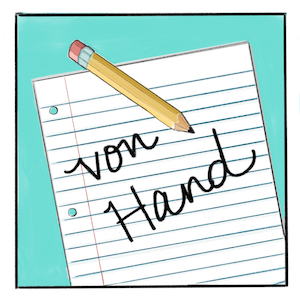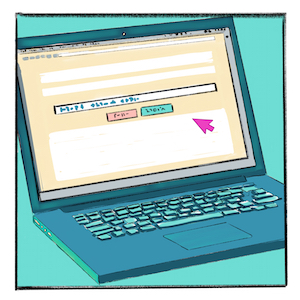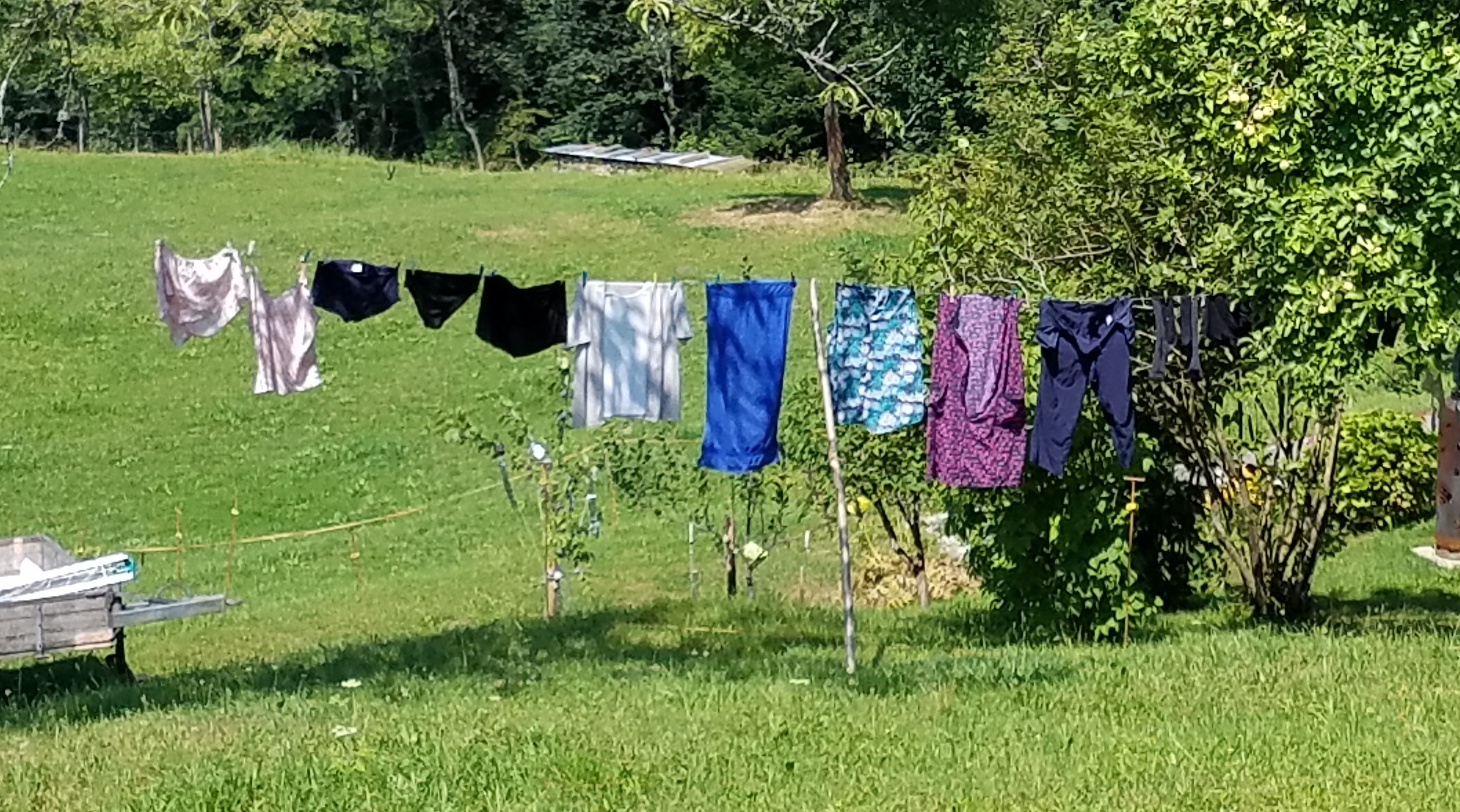In dieser Lektion
Lesen
Vor dem Lesen
Hausarbeit und Putzen: Wie oft putzen Sie Ihr Zimmer oder Ihre Wohnung? Wie putzen Sie es oder sie? Was brauchen Sie zum Putzen? Write a few sentences in German about your cleaning habits and supplies. Keep this piece of writing handy, since you will expand it later on.
Lesen
Karin spricht über die Hausarbeit. Was macht sie täglich, wöchentlich, selten und oft?
Interviewer: Was für Hausarbeit machen Sie täglich?
Karin: Täglich die Routinearbeiten im Bad, also dass wenn man das Bad benutzt, macht man das Waschbecken sauber, macht man die Toilette sauber, hängt man die Handtücher auf, und so weiter. Täglich mache ich in der Küche auch den Abwasch: das Geschirr abwaschen und abtrocknen. Wir haben keine Geschirrspülmaschine, also wir waschen von Hand und wir trocknen von Hand. Und in meinem Zimmer wird täglich das Bett gemacht.
Interviewer: Was machen Sie wöchentlich?
Karin: Wöchentlich haben wir Staubsaugen, Recycling und die Wäsche. Abstauben ist leider nicht so regelmäßig, aber es sollte eigentlich auf dem Plan sein.
Interviewer: Was machen Sie selten?
Karin: Selten ist eigentlich die Arbeit hinter dem Sofa zu saugen, wenn man die Möbelstücke verrücken oder aufheben muss. Das ist so alle Vierteljahre, wenn wir eine größere Putzaktion machen. Die Fenster werden selten geputzt. Ja, das sind die zwei größten Sachen, die Fenster und die unerreichbaren Sachen im Haus.
Interviewer: Karin, beschreiben Sie bitte eine Hausarbeit, die Sie oft machen.
Karin: Also oft räume ich einfach auf, von oben nach unten, von rechts nach links. Das heißt, man beginnt mit den Oberflächen, zum Beispiel auf meinem Schreibtisch oder dem Sofa liegen oft Bücher oder Kleidungsstücke. Ich räume diese Sachen dann weg und stelle sie an ihren Platz zurück. Wenn die Oberflächen frei sind, kann man abstauben oder feucht wischen, je nachdem, was nötig ist. Also, wenn man gegessen hat, gibt es Krümmel. Dann wischt man mit einem feuchten Lappen oder man saugt Staub auf dem Boden. Also von oben nach unten putze ich. Und dann, viele meiner Dinge sind rechts in meinem Zimmer. Ich fange rechts an. Die Tür ist links und ich arbeite mich da langsam vor, damit man nichts vergisst.
Arbeit mit dem Lesen
Kultur
Das Lüften
In both Germany and Austria, airing out your room and your blankets is a typical household chore, just as hanging your clothes to dry—either inside or outside—is more common than using a dryer. In the listening selections that follow, you’ll hear a bit about opening the windows as a precursor to making the bed. That’s because airing out the comforter is an important part of making the beds. In fact, making the bed and airing out the room are often combined into one activity: lüften.
die Luft = air
lüften = to air out
Try this out: go to google.de and search for “richtig lüften.” How many results do you get? What are the basic suggestions of the best way to air out a room? You won’t understand everything on these sites, but try to get the gist on one site. Do you recognize any words? Jot down a few notes about the main points.
In general, you’ll note that there are many specific words for cleaning in German, a fact which reflects a cultural tendency not only to keep things clean but also to place value on the work of cleaning.
Hören
Hören 1: Anna
Arbeit mit dem Hören 1
Hören 2: Barbara
Arbeit mit dem Hören 2
Strukturen
Separable Prefix Verbs
When Barbara explains her process for making the bed, she mentions: “ich schüttle Kopfkissen und Bettzeug aus.” What do you think ausschütteln means? You’ve already learned that the separable prefixes ab and auf have specific meanings, and perhaps based on your knowledge of German, you can figure out that aus mean out, so the separable prefix here is used as: to shake out. Aus is another prefix like ab and auf that adds more specific meaning to a verb when used as a separable prefix. In the context of cleaning, you can use aus as a prefix with ausstauben (to dust out—a drawer for example), ausfegen or auskehren (to sweep out), or auswischen (to wipe out, usually with a damp cloth). And beyond the world of cleaning, aus is also used as a prefix in words like aussteigen (to de-board a train, as you learned in the Reisen und Transport module) and ausgehen (to go out).
To summarize our review of separable prefix verbs, there are two things you should know about this class of verbs. First, separable prefix verbs separate from the main part of the verb; that is, the prefix moves to the end of the sentence, as in “Karin räumt das Zimmer auf.” The verb is conjugated the way it would normally be conjugated and remains in the second position of the sentence, while the prefix sits at the end of the sentence or phrase. Second, different prefixes shift the meaning of the verb—often to make it more specific or sometimes to create a totally new meaning.
Review: Direct Objects (Accusative)
Hausarbeit and household chores revolve around action: someone cleans something. You have already learned and practiced direct objects in many different lessons by now; here is a reminder that the objects that you clean are perfect examples of the direct object, which take the accusative case. In the following example sentences, note that the subject is always ich, but the direct object varies.
pl: Ich mache die Betten.
die: Ich staube die Lampe ab.
das: Ich spüle das Geschirr.
der: Ich fege den Boden.
Here’s a summary chart of the definite and indefinite articles for nominative and accusative case.
| Nominativ | Akkusativ | |
|---|---|---|
| pl | die keine | die keine |
| die | die eine | die eine |
| das | das ein | das ein |
| der | der ein | den einen |
Komposita or Compound Words
As you’ve already learned, German has many compound words, or Komposita. These are two or more words that are strung together to form a new word. You’ve seen many examples of compound words in the chapter, for example Badezimmer, Ferienhaus, and Hausarbeit. These examples all have reasonable English equivalents, but in some cases, what German says with one word take several words in English: der Küchenschank = kitchen cabinets or die Altbauwohnung = apartment of older construction.
Remember that the class of compound words is always the class of the last word. Thus:
die Küche >> die Waschküche
das Zimmer >> das Wohnzimmer
der Tisch >> der Nachttisch
You should be aware that these words exist and that you might have to dissect words in order to decipher the meaning. Also be aware that sometimes an extra letter or syllable is included between the words to make it easier to pronounce, like in Arbeitszimmer. In general, this is a fun aspect of the German language, because it allows you to be creative and construct new words. Plus, it leads to words that are ridiculously long, like Bezirksschornsteinfegermeister (head district chimney sweep), and you can impress your friends not only by pronouncing them, but by explaining how they fit together.
Look back at the vocabulary list below. What compound words do you see?
Schreiben
Einen Putzplan schreiben
Using the notes that you created in class, write about your “Putzplan”. Revise those notes into a complete paragraph about your cleaning habits and the supplies you use. Remember that the point of this activity is to practice the vocabulary and forms that you’ve worked with. Try to use as much of the vocabulary as you can for your writing.
Wortschatz
kehren or fegen ? spülen oder abwaschen ?
What’s up with these two different verbs for “to sweep”? Well, once again you’re seeing some regional difference in language. In Austria and southern Germany, you’re more likely to hear kehren, while in northern Germany, fegen is the preferred term. This carries over into nominalized forms: in Berlin Straßenfeger sweep the streets, but in Austria, this task is completed by Straßenkehrer. Similarly, a Kaminkehrer or Rauchfangkehrer cleans the chimney in Austria or southern Germany, but in northern Germany the term for chimneysweep is Kaminfeger or Schornsteinfeger. And, just like in some other cultures, chimneysweeps are supposed to bring good luck, just like the statue below. But don’t worry: no matter the verb, everyone uses the same Besen!

Similarly, there are two words used for “to wash (the dishes)”: abwaschen and spülen. While these also have some regional variation, both terms are more broadly used and understood. While you might hear spülen more in the north and abwaschen more in the south, people understand both. After all, the machine that accomplishes this chore is called a Geschirrspülmaschine.
Nouns
der Besen, –
der Eimer, –
die Geschirrspülmaschine, -n
der Lappen, –
die Klobürste, -n
die Ordnung (no plural)
das Putzmittel, –
der Schwamm, -¨e
das Spülmittel, –
der Staub (no plural)
der Trockner, –
die Waschmaschine, -n
das Waschmittel, –
das Waschpulver, –
Verbs
abstauben
abtrocknen
abwaschen
abwischen
aufheben
aufmachen/zumachen
aufräumen
fegen or kehren
gießen
putzen
saubermachen
spülen
staubsaugen
waschen
Adjective and Adverbs
dreckig
oft
ordentlich
regelmäßig
sauber
schmutzig
selten
täglich
wöchentlich
Other Useful Words and Phrases
der Putzplan



